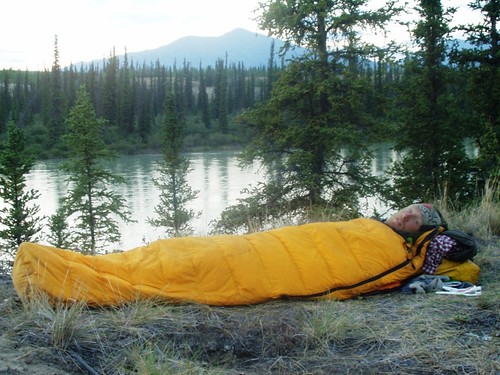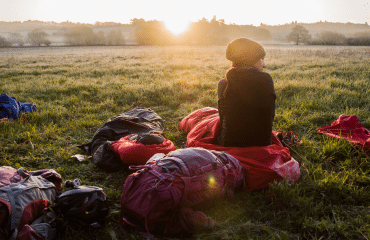Over the next four weeks I am serialising a chapter I wrote for a Lonely Planet book a while ago. I hope you enjoy it as a chunk of old-fashioned vicarious travel writing and a break from the usual blog-fayre of soundbites. Get a cup of tea and a couple of biscuits and enjoy…
“At times the river was jade green and steady, with strange boils of water rising and slowly swirling the surface; at other times it was a sliding mirror. Sometimes it was shallow and jolly. I could look down and watch pebbles rush past as though they were dashing upstream: colourful time capsules; orange, grey, white and black, each one colossally old. We slipped silently over smooth blue water and silt fizzed the bottom of the canoe. The river was our road, we were content on our own and confident in the wild.
I had been travelling alone for almost three years, but that summer a good friend had come to share my journey for a few weeks. The only sounds were the dipping of our paddles and the river. Moose swam the river ahead of us, goofy and striving with huge ears pinned back. They scrambled up the slick bank and disappeared into the undergrowth. Shaggy bears trotted the hillsides. Bald eagles surveyed their domain and watched us from the treetops with utter indifference. From time to time we heard them screech their haunting cry into the silent sky, then soar and plummet downwards with an audible whoosh of air. Above the water, colourful dragonflies hovered and whirred at the surface, and vanished. Beneath us the muscular salmon were racing, resisting all temptations on our trailing hooks. Away from the road, away from the crowd, there was no need for a clock, no need to chat. The silence stood sentinel to time, a tangible presence over the endless river that ridiculed my thoughts of distance or days. The river and the silent emptiness are wed together for ever and each smooth worn, coloured pebble will outlast us all.
When we tired of paddling we could simply sit back and drift, gliding along without effort, relying only on gravity and nature’s energy. We were moving slowly and unstoppably towards our destination. The movement was out of our hands, in the same way that shuttling along the conveyor belt of airport queues and check-ins and boarding and take-off and foil-wrapped food also shuttles you towards your destination. But there are few other similarities between the two types of journey.
Quiet traders and trappers had lived along the banks of the Yukon River for year upon year, until gold was found and the river flowed with men and dreams of wealth. After scores of years and shattered dreams, and a handful of winners, now I was here, following on. There were still hints of the past. We occasionally passed deserted log cabins, relics of the fur trappers and gold prospectors. The history still breathes, the stories still live, but the river runs on and on and on. I felt optimistic for the world in a place that made man’s impact feel so small. It must have been a lonely life back then, requiring real competence and self-confidence in every skill necessary for survival. Walking through an old abandoned settlement, peering into log cabins, I tried to imagine a life so remote that the river and its surroundings equated to the entire world and the river was the only connection to anything beyond.
We were canoeing without a map. We wore no watches. We did not know what day it was, how far we had come, how far we had to go. As we pitched camp on the riverbank, lit a fire, swam, cooked, ate, and slept beneath a silent sky, we had no idea what the next day would hold. But, although I was new to canoeing, a first-timer in the Yukon, and unfamiliar with worrying about grizzly bears disturbing my sleep, I was well used to a life of motion. It was almost three years since I had closed my front door behind me and begun my journey. I knew that it would be least one more year before I arrived back at that front door.
***
There is something primeval and very pure about the human urge to move. We spread across our planet many millennia ago in the greatest journey ever known, a slow, stuttering, almost subconscious expansion of humankind out of Africa, across Asia, over the Bering Straits and on as far as could be gone, down to Cape Horn. Perhaps it is a relic of those days in motion that urges so many people today to keep moving. I had decided to try to cycle round the world in an attempt to scratch my own itch. Uncertain travel held an appeal for me, a luring magic, an intoxicating release from conventional bonds, a chance for self-testing and self-discovery, and the rushing joy of being alive that I rarely felt at home. I was searching for chance encounters and unexpected detours, the sort of experiences that would lead to deciding suddenly, spontaneously, to get off the bike and instead canoe 500 miles down the Yukon River.
Days are long on the road. Pack up and pedal into the dawn. Ride until sunset. It’s easy to kill time but you can kill distance only by riding. Roads roll on forever, linking and connecting and reaching so far ahead that to think about the end is to think of something that feels impossible. So settle for today, for earning the small distance that the day’s long hours will allow you. Roads drenched with rain, stinging hail, pulsing heat, slick ice, buffeted by winds on loose gravel, deep sand, tangled rocks, thick snow. Roads of smooth tarmac down mountainsides on sunny days with warm tailwinds and scenes of impossible beauty. Roads furious with traffic through grim slums, bland scrub, concrete jungles, polluted industrial wastelands. Monotony in motion. Roads too hard and too long that break you, expose you, scorn you and would laugh at you if they cared. Roads on which you pick yourself up, then have a word with yourself and make it to an end you once doubted. Roads you have never ridden to places you have never seen and people you have never met. Days end. A different sunset, a different resting point, a different perspective. A little less road waits for you tomorrow. A little more road lies behind you.
I wanted to raise my arms and stare in wonder over waves of hazy blue mountains. I wanted to wake in my sleeping bag in the desert as the sun rose between my toes. To shiver in a frost rimed tent is to truly appreciate the next warm duvet. A parched desert teaches deep gratitude for running water. These are clarion calls to be alive and to treasure life. On the road you learn to appreciate a simplification of life.




Comments